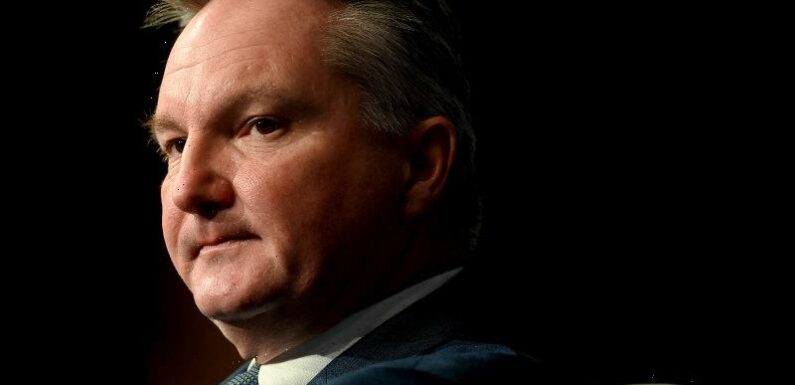
A federal bid to control the price of gas has sparked a furious response from energy producers who fear an open-ended regime that lasts beyond a temporary price cap unveiled on Friday, with analysts claiming the Labor plan is a “declaration of war” on the industry.
The energy industry is mobilising against a long-term “reasonable price provision” after the idea was included in a Treasury consultation paper issued late on Friday after a national deal to impose price caps on coal and gas.
Energy Minister Chris Bowen told gas producers to accept the new regime.Credit:Jeremy Piper
Prime Minister Anthony Albanese announced a cap of $12 per gigajoule for gas and $125 per tonne for coal on Friday after a deal with state premiers to impose the controls on the domestic market, but the Treasury paper included further details that stung industry executives and analysts.
Energy Minister Chris Bowen told gas producers to accept the new regime to govern the “Australian gas under Australian soil” because the industry had a social license that meant it could not expect to charge its high export prices in the domestic market.
Bowen said opponents of the plan were seeking “wartime prices” for gas after the Russian invasion of Ukraine but this meant they were claiming they needed those extraordinary profits for their industry to be viable.
“Nobody’s going to believe that, because it’s not true – 96 per cent of gas last year sold for under $12. The average price was $9.20 a gigajoule,” Bowen told Sky News.
“And for anybody to argue that they need to be able to make more than $12 and double that is just ridiculous. And I don’t think that argument is going to hold any water.”
Credit Suisse analyst Saul Kavonic said the proposal was “infinitely more Draconian” than the price caps and presented a much more severe market intervention than anyone in the industry had been contemplating.
“This may be taken as a declaration of war on the gas industry on the East Coast,” he said.
“In response, we expect a legal challenge, a halt on new gas supply and a campaign against the Labor government similar to the mining tax advertising campaign a decade ago.”
The state and federal energy ministers’ plan to avert the worst impacts of next year’s energy bill hikes by capping the cost of east-coast gas and coal has been welcomed by large manufacturers, which depend on affordable power to stay viable and have been struggling to absorb runaway costs.
“We congratulate federal and state governments on developing a balanced approach to the gas crisis that looks after domestic energy users and the national interest while preserving our role as a reliable and trustworthy energy exporter,” said Andrews Richards of the Energy Users Association of Australia, whose members include companies such as BlueScope Steel, Brickworks and Incitec Pivot.
“There will be the usual gas industry hyperbole about negative impacts but we have heard that before when both Western Australia and Queensland put in place various forms of domestic gas reservation … none of those bad outcomes occurred and investment has continued to flow.”
However, coal and gas companies whose sales revenue stands to be affected have been ramping up warnings that temporary intervention may have negative long-term consequences for supply and prices by deterring investments needed to develop new gas projects or liquefied gas import facilities in south-eastern Australia that will be critical to putting downward pressure on prices years to come.
ExxonMobil and Woodside, which together operate the 50-year-old offshore gas fields in Victoria’s Bass Strait that supply more than 20 per cent of east-coast demand, have warned price caps will put at risk the hundreds of millions of dollars of new investments needed to offset the basin’s rapidly declining output and maintain reliable supplies.
Woodside on Friday said the $12-a-gigajoule gas price gap would prevent the market from “functioning as it should” with buyers and sellers negotiating an outcome that benefits both.
“That process ensures that the lights stay on, that industries can continue producing the goods and services we all need and that the jobs they provide are preserved,” a company spokesperson said.
Under the proposed “reasonable price” provisions from 2023, gas producers will be required to offer supply contracts that reflect the domestic cost of production plus a reasonable margin, while the spot market will not be regulated.
Analysts say the institutionalised price will prompt producers to deliver greater volumes into the spot market and be a disincentive to bringing new domestic supplies online, elevating the threat of blackouts.
“Labor has crossed the Rubicon with this gas policy, with further expansive interventions inevitable to address the many unintended consequences … as the government moves to a command-and-control structure for east-coast gas without the regulatory capacity to deliver on it,” Kavonic said.
A consultation period on the price caps component of the draft legislation closes on Thursday, less than a week after it opened.
“A consultation period of only a few days is nowhere near enough to work through the implications,” he said.
Cut through the noise of federal politics with news, views and expert analysis from Jacqueline Maley. Subscribers can sign up to our weekly Inside Politics newsletter here.
Most Viewed in Politics
From our partners
Source: Read Full Article
